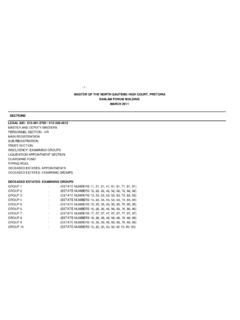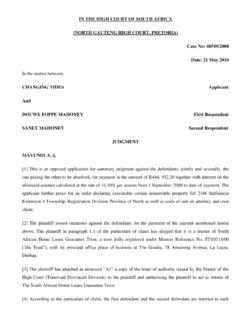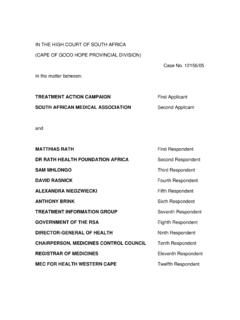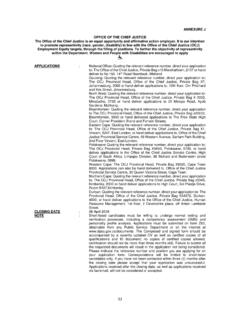Transcription of IN HIGH COURT OF SOUTH AFRICA KWAZULU …
1 IN high COURT OF SOUTH AFRICA KWAZULU - natal local division , durban CASE NO: 9935/2014 AUTOPACK DISTRIBUTORS CC PLAINTIFF And COMPENDIUM INSURANCE GROUP (PTY) LTD DEFENDANT _____ JUDGEMENT Delivered: 07 August 2015 MBATHA J [1] The Defendant has noted an Exception to the Plaintiff s particulars of claim on the basis that they are vague and embarrassing, and alternatively fail to disclose a cause of action. [2] A notice to the Plaintiff to remove the cause of complaint was delivered in terms of Rule 23(1) of the Uniform Rules of COURT . The Plaintiff did not respond to that notice, which precipitated this application before me. 2 [3] It is important that I first deal with the applicable principles in an Exception as stated in Erasmus, Superior COURT Practice at B1 154 to B1 154A.
2 (a) In each case the COURT is obliged first of all to consider whether the pleading does lack particularity to an extent amounting to vagueness. Where a statement is vague it is either meaningless or capable of more than one meaning. To put it at its simplest; the reader must be unable to distill from the statement a clear, single meaning. (b) If there is vagueness in this sense, the COURT is then obliged to undertake a quantitave analysis of such embarrassment as the excipient can show is caused to him or her by the vagueness complained of. (c) In each case an ad hoc ruling must be made as to whether the embarrassment is so serious as to cause prejudice to the excipient if he or she is compelled to plead to the pleading in the form to which he or she objects. A point may be of the utmost importance in one case, and the omission thereof may give rise to vagueness and embarrassment, but the same point may in another case be only a minor detail.
3 (d) The ultimate test as to whether or not the exception should be upheld is whether the excipient is prejudiced. (e) The onus is on the excipient to show both vagueness amounting to embarrassment and embarrassment amount to prejudice. (f) The excipient must make out his or her case for embarrassment by reference to the pleadings alone. 3 (g) The COURT would not decide by way of exception the validity of an agreement relied upon or whether a purported contract may be void for vagueness. Furthermore, the exception must relate to the entire cause of action and not a paragraph thereof. [4] Briefly, the Defendant acted as an insurance broker for the Plaintiff. The Defendant had to procure an insurance cover for the Plaintiff from Hollard Insurance Company. The Plaintiff had its premiums up to date when on the 25th of August 2011 a fire broke out in its premises and caused extensive damages totalling to a sum of R33 874 The insurance company repudiated the claim.
4 The Plaintiff then sued Hollard Insurance Company in North Gauteng high COURT , where the Insurance Company defended the claim on the basis that the installation of an insured machine by the Plaintiff did not comply with certain national standards and regulations. Therefore, the Plaintiff had not complied with the warranty agreement as a result that the Plaintiff s claim was compromised at R1,8 million. [5] Then the Plaintiff proceeded against the Defendant on the basis that the Defendant owed a duty of care to the Plaintiff in that it ought to have ensured that the Plaintiff was adequately insured. The Plaintiff contends that the Defendant failed to draw to its attention the obligations imposed by the insurer, including the specific warranties in the policy pertaining to the installation of the Plaintiff s equipment and machinery and that in terms of the policy the Plaintiff was required to have ensured that the installed equipment 4 and machinery were covered by a certificate of compliance issued by a master installation electrician.
5 [6] The excipient s case is that the Plaintiff s claim appears to be based on a duty of care owed by the excipient to the Plaintiff. It is submitted that a breach of that mandate would require the Plaintiff to plead the terms of the mandate. The mandate would be a contract of agency and the liability of the insurance broker would be determined by the terms of the mandate. However, there are no allegations made in the particulars of claim of the conclusion of such a mandate. The Plaintiff has failed to plead the basis for the existence of such a duty. It is further submitted that a breach of a contractual duty does not necessarily constitute a wrongful act for purposes of Aquilline liability. It is further averred in the heads of argument that it is not the duty of the broker to ensure that the Plaintiff had to comply with his obligations under the insurance policy.
6 It is further submitted that there is no allegation that the Plaintiff would only have been required to comply with the national standards and regulations if the Defendant had informed the Plaintiff that those were required in terms of the policy of insurance. Therefore, the excipient seeks an order that would grant the Plaintiff leave to amend its particulars of claim to cure the causes of complaint, besides upholding the exception. 5 [7] In opposing the application, the Plaintiff avers that the broker is an agent and the laws of agency come into play in this scenario. He has the information within his knowledge. Such a contract of mandate obliges the agent to fulfil his mandate faithfully, honestly and with due care and diligence. This is implied in the allegation by the Plaintiff that the Defendant s acting as a broker for purposes of securing insurance is that an agreement existed between the Plaintiff and the Defendant for such purpose.
7 It further avers that the Defendant was obliged to have informed the Defendant of the terms of the policy. The Plaintiff has disclosed a cause of action and that the failure of the broker to inform the Plaintiff of the terms of the policy is the factual basis of the Plaintiff s claim. I was referred to Evins v Shield Insurance Co. LTD1 on this aspect. [8] The test in deciding an exception is clearly set out in one of my opening paragraphs as stated in Erasmus. An exception that a pleading is vague and embarrassing should not be directed at a certain paragraph of the pleading but at the cause of action as a whole, which must be demonstrated to be vague and embarrassing. Jowell v Bramnell Jones and Others2 states as follows: I must first ask whether the exception goes to the heart of the claim and, if so, whether it is vague and embarrassing to the extent that the Defendant does not know the claim he has to 1 1980 (2) SA 814 at 825 g.
8 2 1998 (1) SA 836 (W) at 905E-H 6 Vagueness could arise from the formulation of the pleading, absence of necessary averments or incomplete pleadings. Serious prejudice must arise from these defects. [9] It must also be borne in mind what is stated in Rule 18(4) of the Uniform Rules of COURT which requires that every pleading Shall contain a clear and concise statement of the material facts upon which the pleader relies for his sufficient particularity to enable the opposite party to reply thereto. It must also not be forgotten that the object of pleadings is to define the issues between the parties. In Odgers Principles of Pleading and Practice in Civil Actions in the high COURT of Justice 22nd Edition at page 113, it is stated as follows: The object of pleading is to ascertain definitely what is the question at issue between the parties; and this object can only be obtained when each party states his case with precision.
9 [10] I have applied the aforementioned tests to the particulars of claim before me. I have to be persuaded by the excipient that the pleading is excipiable on every interpretation that can be reasonably be attached to it. See Picbel Groep Voorsorg Fonds (in liquidation) v Somerville and related matters3. 3 2013 (5) SA 496 (SCA) at 501 A-B. 7 [11] The Plaintiff was given a notice to cure the defect by the Defendant, but did not act upon it. It did not concede even at that stage that the particulars of claim were excipiable. [12] It was submitted on the behalf of the Defendant that it is not clear whether this was a delictual or a contractual claim. The Defendant relied here on the decision in Wellworths Bazaars LTD v Chandlers LTD and Another4 which held that a declaration in which damages are claimed and which does not set out clearly whether the claim is based on delict or a breach of contract or on both, is excipiable as being vague and embarrassing.
10 It was further submitted that the causal relationship between conduct and result was not set out in the particulars of claim and what is stated in the paragraph 23 of the particulars of claim is not sufficient. There is no allegation explaining the mandate, which mandate should be found in the contract. It relied on Harvest Trucking Co. LTD v Davis T/A Davis Insurance Services an English case taken from Lloyds Law Reports page 639. It submits that at best the Plaintiff should have set out the terms of the contract. I do not agree with this submission as it is clear from the particulars of claim that there was a contract between the parties. [13] My understanding of the basis of the Plaintiff s claim is that the Defendant is sued on the basis of his failure to bring to the attention of the Plaintiff the material provisions of the contract which led to the compromise of the Plaintiff s claim.














